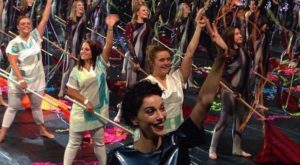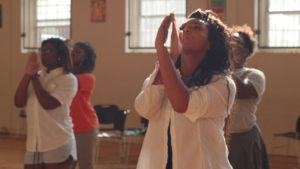 Discuss: Wisconsin Film Festival Programming, Part Three of Three
Discuss: Wisconsin Film Festival Programming, Part Three of Three
2017 Wisconsin Film Festival, March 30-April 6
Film Guide available at wifilmfest.org/2017»
James Kreul continues the Madison Film Forum tradition of breaking down the “Big Three” categories at the 2017 Wisconsin Film Festival.
The Big Auteurs—International Narrative Features»
The Big Indies—American Narrative Features»
Today: The Big Docs—Non-Fiction Features
For other entries in our 2017 Wisconsin Film Festival coverage, click on #wifilmfest in the navigation menu.
The documentary programming at the 2017 Wisconsin Film Festival will resonate with more people this year as we sink into the era of “fake news,” “post-truth,” and as Time Magazine asks “Is Truth Dead?” on its cover. I mentioned in the Big Indies preview that some micro-budgeted indie features seem to lack a sense of urgency and commitment. It’s just the opposite for current documentary filmmaking, as everyone, filmmakers and audiences alike, understand the importance of telling a wide range of stories from the real world, and telling them vividly and truthfully.
Despite the best laid plans, our Big Docs overview comes a little late, and will be a little short. But hey, by the end of this post we will have reached nearly 13,000 words written about the 2017 Wisconsin Film Festival at the Madison Film Forum, so I suppose I should not be too hard on myself.
The good news is that there’s a wide range of stories and approaches this week; the bad news is that makes it almost impossible to summarize the week succinctly without regrets about leaving out many films. The solution, of course, is to go beyond the titles listed here, and commit yourself to seeing a few documentaries about subjects you know little about. You’re guaranteed to come across at least a few pleasant, eye-opening surprises.
 Quest | Jonathan Olshefski | USA | 2017 | 105 min»
Quest | Jonathan Olshefski | USA | 2017 | 105 min»
Quest is a beautiful film. Please see it if you can.
It begins in 2008 on the eve of the Obama presidency, and ends with hints about what’s to come the 2016 election. In between, we follow the lives of Christopher “Quest” Rainey, his wife Christine’a, and their daughter P.J. as they live their lives in North Philadelphia. Quest delivers newspapers and runs a home-recording studio for aspiring rap artists; Christine’a works in a domestic violence center; P.J. is an aspiring musician but also a typical early teen. By telling the Rainey family’s story, director Jonathan Olshefski provides a portrait of the working poor that shatters many stereotypes and misconceptions.
The middle of the film also documents a traumatic event in the lives of the Rainey family, which in other hands would have been exploited for sensationalism. But neither Olshefski nor the Rainey family change their pace or approach to life as they confront the crisis with love and determination. The long-term, 8-year approach to documenting the Raineys recalls Hoop Dreams, and the changes for young P.J. are particularly striking by the end. But the consistency on display in the relationship between Quest and Christine’a over those 8 years, as they provide a loving home for themselves and P.J., is equally impressive.
Contemporary Color | Bill Ross IV, Turner Ross | USA | 2017 | 97 min»
We began our coverage of the 2017 Wisconsin Film Festival ten days ago with Edwanike Harbour’s review of Contemporary Color. To her comments I will only add that I found the film far more interesting and emotionally rich than I expected. Those expecting a straight forward concert film might be frustrated by the interruptions to performances to show what’s going on backstage or to provide backstory. But the mosaic approach makes Contemporary Color a much better film. Even though the approach is the exact opposite of the 8-year commitment in Quest, the short bursts of observations and insights do deliver emotionally satisfying moments.
I was also intrigued by the strategies the Ross Brothers and their team of cinematographers used to provide enough visual variation from performance to performance. One could argue that they’ve played all of their cards by the 3/4 mark, but even when things seem to repeat near the end the visceral impact remains loud and colorful. If you’re going to see this, see it big and loud. I watched it with headphones to compensate my home speakers, and I can testify that the overall sound design is great as the cinematography.
My colleague Catherine Capellaro also contributed a capsule review of Contemporary Color at Isthmus.
 Dina | Dan Sickles, Antonio Satnini | USA | 2017 | 101 min»
Dina | Dan Sickles, Antonio Satnini | USA | 2017 | 101 min»
Both screenings of Dina, which won the 2017 Grand Jury Prize for documentary at the Sundance Film Festival, very quickly reached rush tickets only status. The combination of an interesting topic (a 49-year-old woman navigating the ups and downs of coupledom with her fiancée) and an interesting formal strategy (Mike King describes “each scene a lovingly composed single shot) should make Dina worthy of navigating the rush ticket lines. Contrary to popular belief, it is not that hard to get into screenings that sold out advance tickets.
American Anarchist | Charlie Siskel | USA | 2016 | 82 min»
American Anarchist has become timely due to current headlines. Just yesterday, the New York Times reported that William Powell, author of The Anarchist Cookbook, and subject of American Anarchist, had died at the age of 66. Actually, he died on July 11 last year, known only to friends, family, and Facebook followers. His death was not more widely known until the theatrical release of American Anarchist last week; his death is noted in the closing credits.
The film itself has an impressive pedigree. Charlie Siskel’s previous film was the acclaimed and Oscar nominated Finding Vivian Mayer. Chris Lay reviewed American Anarchist yesterday at Tone Madison.
Abacus: Small Enough to Jail | Steve James | USA | 2016 | 88 min»
New Madison Film Forum contributor Nicole Rogers reviewed the latest documentary from the director of Hoop Dreams and Life Itself earlier this week. At Isthmus, Kenneth Burns contributes a review of the film in today’s issue. From those reviews, it seems like James has delivered yet another engaging human portrait that resonates with social and political issues.
 STEP | Amanda Lipitz | USA | 2017 | 83 min»
STEP | Amanda Lipitz | USA | 2017 | 83 min»
My initial interest in STEP was partially due to my fascination with African-American girl’s dance teams, inspired by one of the best fictional films in last year’s Festival, The Fits. But one does not have to look very hard to discover that the critical response to the film goes beyond those with a general interest in the subject matter. STEP currently has a 100% Tomatometer Rating at Rotten Tomatoes (only seven reviews, of course). Geoff Berkshire at Variety concludes, “this ebullient chronicle of a Baltimore girl’s step team’s senior year matches a fascinating, worthy subject with unabashedly joyful filmmaking.”
STEP might fly in under the radar, with only one screening on closing night, as one of the overlooked gems of the Festival. Advance tickets for that one screening are still available. This presents me with a dilemma, because it is programmed opposite of King of Jazz. If it weren’t for that schedule conflict, STEP would be a no brainer.
Titicut Follies | Frederick Wiseman | USA | 1967 | 84 min»
I’ve seen Frederick Wiseman’s seminal Titicut Follies many times, so it is easy for me to forget that not everyone has. Unseen for many years after its initial release due to legal conflicts (unless you could document that you would screen it for medical/professional purposes), Titicut Follies expertly utilizes so many technical and formal strategies of observational documentary that it is hard to remember that the form barely existed before its completion.
Certainly a staple of documentary history courses for many years after it became readily available again, general audiences might not have had an opportunity to see the film outside of a classroom. Anyone interested in documentary history, and anyone interested in the tradition of observational documentary that made films like Quest possible, should catch this screening.
Titicut Follies is not for the squeamish, however. It’s portrait of life for inmates at the Bridgewater State Hospital for the Criminally Insane is unflinching, and please note my choice of the word “inmates” rather than “patients.”
Other Notable Screenings
Several Festival guests will present their topical documentaries. Producer Jennifer MacArthur will present Whose Streets?, a portrait of the Black Lives Matter movement in Ferguson, Missouri during and after the protests objecting to the death of Michael Brown. Director Murat Eyuboglu will present is environmental documentary The Colorado, which traces the history and ecology in the relationship between humans and the Colorado River. And more locally, Katherine M. Acosta will present Divided We Fall, her documentation of the Act 10 protests at the Wisconsin state capitol in 2011. Curiously, while ticket sales were so crazy for the Packer-themed The 60 Yard Line that a second screening was added, advance tickets are still available for Divided We Fall.
Other intriguing quick picks: The Cinema Travellers (both screenings rush only), Machines (cinematography award at Sundance), and Look & See: A Portrait of Wendell Berry (Special Jury Award for Visual Design at 2016 SXSW; reviewed by Catherine Capellaro in Isthmus).